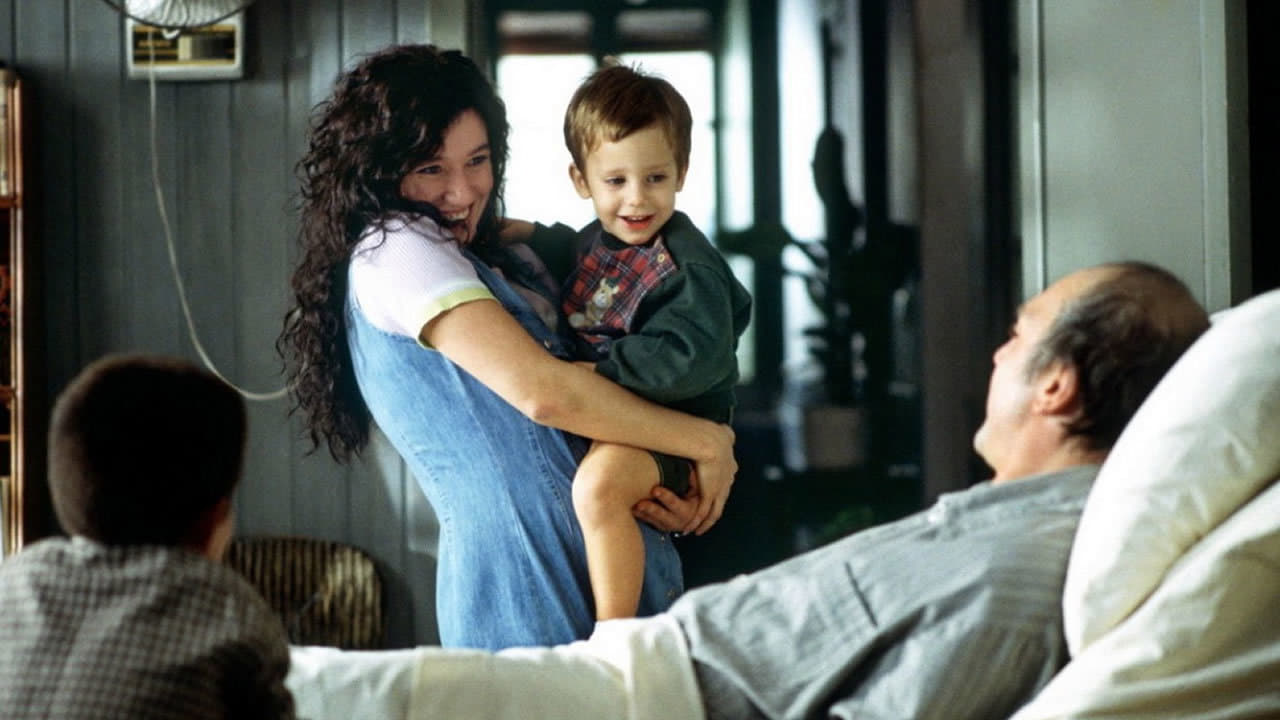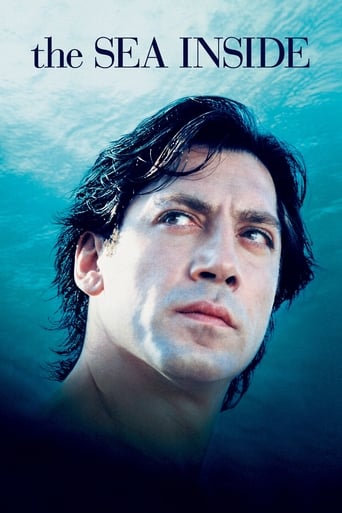tomcnult
The movie Mar adentro, released on November 14, 2004 by Alejandro Amenábar details the current life of Ramón Sampedro, a quadriplegic who was paralyzed a the age of twenty-six after diving off a cliff and breaking his neck on the ocean floor. Now, twenty-four years later at the age of fifty-four, Ramón is fighting for his right to die as he sees his own body as a prison for a man who once traveled the world and experienced a wholesome life. To him, life in this state has no dignity, and having the ability to die how he wants is a way for him to leave dignified. This movie briefly examines the issues of euthanasia and physician assisted suicide, showing some of the hardships that quadriplegics and others with chronically painful conditions experience. Having the opportunity to die how they want, in a painless way, surrounded by friends and family seems to be the goal for Ramón. He appears in court, supported by a lawyer, members of his family, and a few friends. He's petitioning the courts to change the laws, and re-examine the current ones that deny patients the right to die. Ramón planned on testifying, however, he was denied the ability to by the judges present.To this day, euthanasia is still illegal in Spain. Since 2002, patients have had the right to refuse medical treatment, such as respirators or chemotherapy, but euthanasia and assisted suicide is still a criminal offense. In the movie, religion is used as a focus in the statements of Ramón's lawyer. It was stated that even though Spain, as many other first-world countries do, claims to be a secular government, with a distinct separation between church and state. However, the lawyer claims, the law against euthanasia has its roots in religious ideas and morals. It is true, in fact, that religion still has a large influence over much of the legislation passed not only in Spain or the United States, but also in many countries all over the world. Even though many countries claim to be autonomous from religion, many lawmakers and leaders are swayed by personal beliefs and/or prejudices against certain forms of legislation, such as the right to die. For Spain, there are still elements of the Franco regime that are left over even after his death. Francoist values and beliefs regarding the merging of church and state and the influence of religion over laws and social norms are still very popular among a large portion of the population. In the movie, it is said that around 67% of the general population supported the idea of euthanasia.The film itself seemed to be very well done. The story was captivating and emotionally jarring. There were parts that were depressing, but overall there was a general uplifting feeling about the aesthetic and general feel of the film, which is something I can't quite explain or pinpoint an exact reason for. The acting was incredible. Javier Bardem, who played Ramón, and Belén Rueda, who played Julia, seemed to be stand outs for their acting. They did such a great job in conveying, what looked like, actual pain for what their characters were experiencing. On top of that, the grand wide shots of the scenery of Spain's mountains, rivers, forests and coasts were expertly wedged in between emotional scenes that really seemed to add something that was important for the characters. In some movies, there are scenes that focus on the wilderness or wide shots of scenery that seem to be out of place, but that was not the case in this film. The music was perfect for many of the scenes, and since Amenábar composed it, I think that allowed him to complete his artistic vision for the movie through the directing and composing of all aspects of his film.The message of the film was very clearly conveyed. It detailed examples of individuals who were experiencing great suffering, and had gotten to the point where they just wanted it to end. Euthanasia is a difficult topic, and there were some difficult scenes to watch in the movie, which I think is why it was so effective. There was very little sugar coating from Amenábar. However, I do feel the need to comment on the fact that I thought the issue was sensationalized in this movie. Understanding that this was a movie and not a documentary, the issue of suicide and assisted suicide is not something that is easy to talk about. On that note, though, I do not think that dramatic music and panning landscapes is the best way to provide people with exposure to the issue. It may start the conversation, but that conversation is going to be very biased and black and white towards one side or the other. With any issue that provides many moral and ethical dilemmas, everyone is going to have a strong opinion about it. I think that it is important to provide an understanding of the fact that it is not an easy decision or position to take, and instead of sensationalizing an issue like suffering and euthanasia, we need to have a serious conversation about it.Amenábar did a very good job of showcasing the point of view of the sufferer in the situation, and not just with people who are severely paralyzed. Julia, one of the other main characters, seems to be suffering from numerous strokes. She continues to have them, and every subsequent stroke provides more challenges, more physical therapy, more frustration, and more hopelessness. Understanding that people who are terminally ill are not just dealing with the physical limitations, they also have to deal with the sadness, the depression, and the feelings of hopelessness that comes with knowing that you won't ever get better. It is important to know that physical suffering can come with emotional suffering, and that emotional suffering can come with physical suffering, but also that one can arise without the other.
grantss
Powerful, thought-provoking movie about life, death and the right to die. The true story of Ramon Sampedro, a Spanish quadriplegic for 29 years who fought for the right to kill himself. Explores his and motivations and rationality for wanting to commit suicide, plus life, loves and psyche. Told from Sampedro's perspective, so not entirely a balanced debate. However, there are some characters in the movie who represent the "don't do it" argument, though their arguments aren't as forcefully told or as coherent as the lead character's.Very emotional at times, and the last few scenes are incredibly powerful.Superb performance by Javier Bardem in the lead role. Supporting cast don't put a foot wrong either.Won the best Foreign Language Film Oscar in 2005. Interesting to note that in 2005 the Best Picture Oscar (plus a few other Oscars) went to the brilliant "Million Dollar Baby", which explored similar themes.
Maz Murdoch (asda-man)
The Sea Inside is a fantastic Spanish film starring Javier Bardem as a quadriplegic who wants to end his life with dignity. I know that a lot of people will condemn this film for supporting euthanasia and giving a one-sided debate, but this isn't a film about a euthanasia debate. It's not something a religious studies teacher will put on for their GCSE class. The Sea Inside is simply about Ramon and the brilliantly written characters which surround him. I firstly have to praise the outstanding performances in this film. Javier Bardem is extraordinary as Ramon and manages to pull off a string of different emotions without using any part of his body (aside from his head of course). It's a magnificent performance and far from his psychopathic Sugar in No Country For Old Men. Belen Rueda (a somewhat underrated actress) is also breath-taking in her role as a lawyer befriending Ramon and suffering from a life threatening disease herself.The Sea Inside manages to captivate its viewers for its entire two hour running time, which is no mean feat for a film largely set in a man's bedroom. Alejandro Amenábar's directing is often extraordinary and always captivating. There's a magnificently heart-breaking moment where Ramon imagines getting out of bed and flies out of the window to the operatic tune of Nessun Dorma. The fluid camera work is quite extraordinary and dream-like. It perfectly captures Ramon's desire to be free, and makes us all appreciate the use of our able bodies.Alejandro Amenábar's screen writing screens are also quite brilliant. Whilst the film does have plenty of emotionally draining moments, there are also plenty of uplifting ones too to make you smile. He makes Ramon a sympathetic and extremely likable character, as well as the good-natured people who surround him. I especially enjoyed the romantic sub-plot which is sure to pull at anyone's heart strings. The Sea Inside largely works so well because of its magnificent characters and powerful dialogue.The film is all the more painful to watch because we know how it's going to end. The suicide scene is pretty intense to watch with the camera stationary, allowing us to see Ramon die almost like in real time. And whilst the film may not be as relentlessly painful to watch as say, Amour, it still has plenty of powerful moments and many did actually pull on my tear ducts, which is a very rare thing for me. The only films to actually make me cry are Amour and Dancer in the Dark, but The Sea Inside did make me tearful. This is a fantastic film about humanity and the right to freedom. It's a film I'd highly recommend to everybody.
runamokprods
On first viewing I really liked this film. I loved the acting and the style but I felt a certain emotional distance keeping me from labeling it great. But on second viewing, I found myself far more deeply moved, while still being intellectually challenged by the moral, emotional and ethical complexity of the story of a brilliant quadriplegic man with much to give the world wanting to die. Bardem gives a truly heartbreaking, world class performance, and is closely matched by those around him. Director Amenabar also wrote the score for his own film and it is terrific and original. Throughout, there were some stylish touches that gave me a visceral shiver. A few simplistic scenes, and slower moments keep me from calling it a perfect film, but it's not far off.

